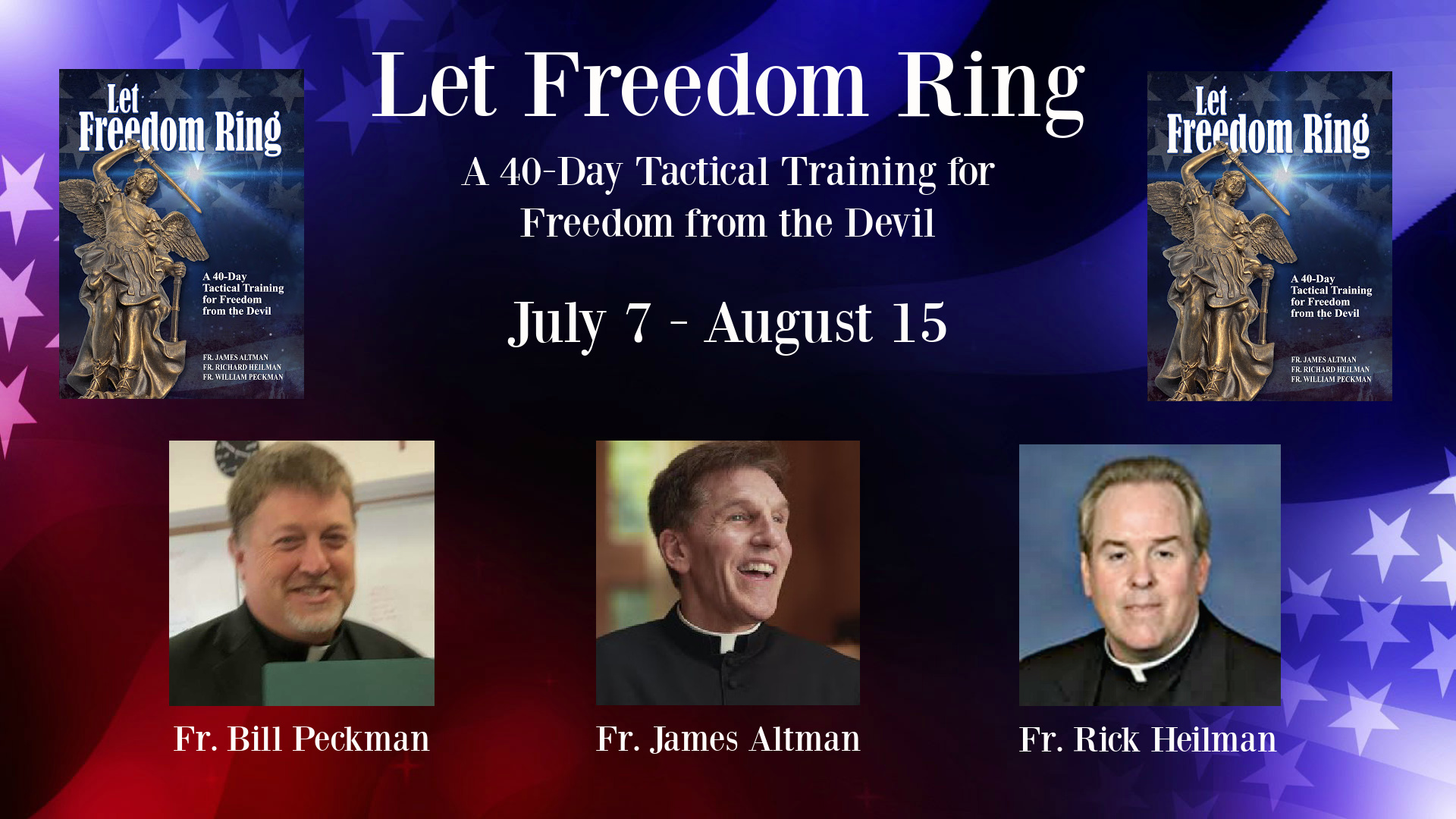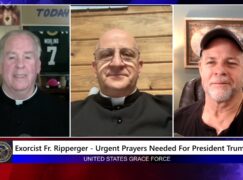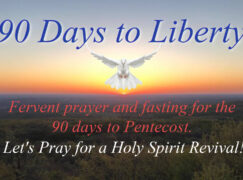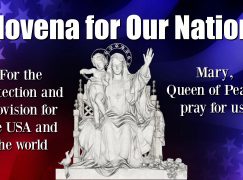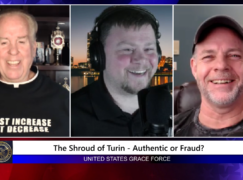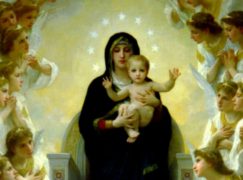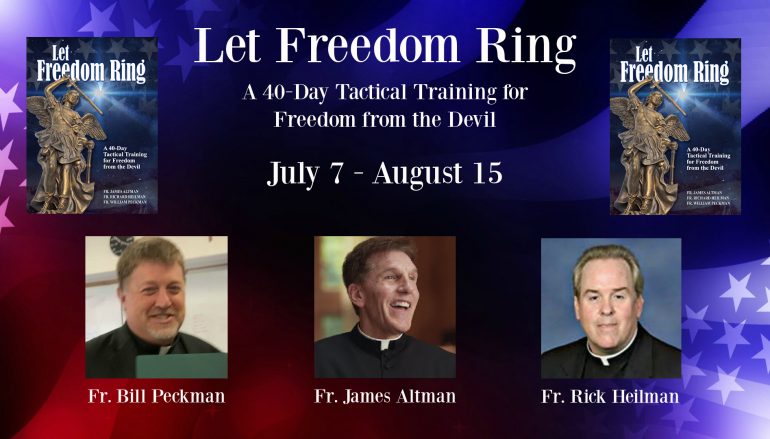

Day 12 – Let Freedom Ring: Freedom from Stinginess/Miserliness
Let Freedom Ring: Freedom from Stinginess/Miserliness
My Lord and Savior Jesus Christ,
At a word from You the devil and his minions flee in terror.
You are the source of all truth. You are the source of all strength.
By the power of your Cross and Resurrection, we beseech You, O Lord
To extend Your saving arm and to send Your holy angels
To defend us as we do battle with Satan and his demonic forces.
Exorcise, we pray, that which oppresses Your Bride, The Church,
So that within ourselves, our families, our parishes, our dioceses, and our nation
We may turn fully back to You in all fidelity and trust.
Lord, we know if You will it, it will be done.
Give us the perseverance for this mission, we pray.
Amen
Our Lady of the Immaculate Conception…pray for us
St. Joseph…pray for us
St. Michael the Archangel…pray for us
(the patron of your parish )… pray for us
(your confirmation saint)…pray for us
“Freedom from Stinginess/Miserliness” by Fr. James Altman
Dear family, who is the one person that most often comes to mind when we think of stingy misers? For many it may be the infamous Ebenezer Scrooge, from Charles Dickens’ 1843 novella, A Christmas Carol. At the beginning of the story, Scrooge is a cold-hearted miser who despises Christmas. His attitude can be summed up in two words: “Bah, humbug!” Dickens describes Scrooge as “a squeezing, wrenching, grasping, scraping, clutching, covetous, old sinner! Hard and sharp as flint … secret, and self-contained, and solitary as an oyster.” Yes, that about sums up the image we have when we see Scrooge’s heartless attitude toward his clerk, Bob Cratchit, whose household includes the crippled child, Tiny Tim.
Maybe you, like me, have run into some Scrooges in your lifetime – miserly people who are stingy with their money like Ebenezer Scrooge. The adjective miserly evolved from the Latin word miser, which means “unhappy, wretched.” How often do we see unhappiness and wretchedness in the genuinely stingy and miserly?
Why are the stingy and miserly unhappy and wretched? Because misers are a step beyond mere frugality. They are a leap beyond mere prudence in spending. Misers are those who love the accumulation of money, which brings them into direct conflict with the first commandment, to love God above all things.
Jesus directly taught us on this very issue in a parable entitled The Rich Fool, emphasis on the word “fool”: “There was a rich man whose land produced a bountiful harvest. He asked himself, ‘What shall I do, for I do not have space to store my harvest?’ And he said, ‘This is what I shall do: I shall tear down my barns and build larger ones. There I shall store all my grain and other goods and I shall say to myself, ‘Now as for you, you have so many good things stored up for many years, rest, eat, drink, be merry!’” But God said to him, ‘You fool, this night your life will be demanded of you; and the things you have prepared, to whom will they belong?’ Thus will it be for the one who stores up treasure for himself but is not rich in what matters to God” (Luke 12:16-21).
Perhaps it was grace that inspired Dickens to write The Christmas Carol – grace that enabled him to understand that we are formed by our experiences, but all is not lost. It is not too late; it is never too late, to change. The actual novella opens with a description of Scrooge’s lonely and unhappy childhood, and his aspiration for money to avoid poverty. Unlike the rich fool, Scrooge indeed overcame his early formation and, as we know, when he did there was joy: “I don’t know what to do! I am as light as a feather, I am as happy as an angel, I am as merry as a school-boy. I am as giddy as a drunken man. A merry Christmas to everybody! A happy New Year to all the world! Hallo here! Whoop! Hallo!”
It is not likely that our own transformation from stinginess and miserliness will arise from being visited by three ghosts, Past, Present, and Future; however, we do not need nocturnal visits from ghosts to effect a change in ourselves. Rather, if we are open to it, we may make the effort to ponder our own past experiences, then meditate upon how these experiences have formed us and resulted in our present, and then make a firm purpose to amend our future, an amendment to be less stingy and miserly with anything we have.
Certainly, this applies to any material goods, but perhaps most importantly to our time – time we could spend in prayer of thanksgiving, intercession for others, even imploring God on our own behalf. Indeed, what may be most required of us is our time; it so often is a lot easier to just throw some money at a problem, but extremely difficult to spend some personal time fixing it. How stingy and miserly we are with our time. How little we comprehend the implications of the words God spoke to the rich fool: “this night your life will be demanded of you.”
Dear family, we must examine our lives. As the great Socrates is said to have uttered: “The unexamined life is not worth living” (as described in Plato’s Apology, which is a recollection of the speech Socrates gave at his trial. (38a5–6)). One commentator described the meaning of Socrates’ statement thusly: “It means any life which is not checkmated, unaccountable is not worth living. It tries to emphasize that everyone has to live a life that they should be proud of, a life that they can look back to what they achieved and say yes indeed I made a mark or I have not lived up to my expectations, so I need to make amends.”
We must examine our lives and when we do, let us keep in mind the sobering words of the ghost of Jacob Marley: “‘I wear the chain I forged in life,’ replied the Ghost, ‘I made it link by link, and yard by yard.’” And when we examine our lives let us understand the truth spoken by Scrooge after the visit of the ghost of the Future: “Are these the shadows of the things that Will be, or are they shadows of things that May be, only?” In other words, Scrooge asked it if was too late to change. No, dear family, it is not too late, it is never too late, to change.
Scrooge changed because the three ghosts forced him to examine his life. Let us force ourselves to do the same. After all, that is the whole point of the Examination of Conscience we are supposed to do before entering the Sacrament of Reconciliation. In that examination, let us ask ourselves if we truly love God above all things, or whether we are stingy and miserly with any or many of the gifts God has given us, especially the gift of time. Let us not fear such an examination, but rather revel in the fact that we know transformative grace will come to us through the sacrament. Let us pray that through this transformation it may be said of us as it was said of Scrooge in some concluding words of A Christmas Carol: “And it was always said of him, that he knew how to keep Christmas well, if any man alive possessed the knowledge. May that be truly said of us, and all of us!”
Prayer of Reparation
My Lord and my God, we have allowed the temptation of the devil to move our hearts toward stinginess and miserliness. We have fallen into stinginess and miserliness when we have not lived up to the call of our baptism by not giving back to You a just tithing of our wealth of time, talents, and treasure. We cling to things so much, forgetting the truth that “we can’t take it with us.” We ignore the words of the great Job: “Naked I came forth from my mother’s womb, and naked shall I go back there. The LORD gave and the LORD has taken away; blessed be the name of the LORD!” (Job 1:21). In our weakness, we have been weak in faith and clung to our wealth like the rich fool. In so many ways, we fear the loss of temporal wealth more than we fear the loss of heaven. We turn to You Lord, in our weakness, and beg Your forgiveness for our stinginess and miserliness. We love You Lord, and we beg for the courage to live out the generosity of the Psalmist: “How can I repay the LORD for all the great good done for me? I will raise the cup of salvation and call on the name of the LORD. I will pay my vows to the LORD in the presence of all his people” (Psalm 116:12-14). We know Lord, if You will it, it will be done. Trusting in You, we offer our prayer to You who live and reign forever and ever. Amen.
Prayer of Exorcism
Lord God of heaven and earth, in Your power and goodness, You created all things. You set a path for us to walk on and a way to an eternal relationship. By the strength of Your arm and Word of Your mouth, cast from Your Holy Church every fearful deceit of the devil. Drive from us manifestations of the demonic that oppress us and beckon us to stinginess and miserliness. Still the lying tongue of the devil and his forces so that we may act freely and faithfully to Your will. Send Your holy angels to cast out all influence that the demonic entities in charge of stinginess and miserliness have planted in Your Church. Free us, our families, our parish, our diocese, and our country from all trickery and deceit perpetrated by the devil and his hellish legions. Trusting in Your goodness Lord, we know if You will it, it will be done, in unity with Your Son and the Holy Spirit, one God, forever and ever. Amen.
Litany of the Most Blessed Sacrament
Lord, have mercy. R. Lord, have mercy.
Christ, have mercy. R. Christ, have mercy.
Lord, have mercy. R. Lord, have mercy.
Christ, hear us. R. Christ, graciously hear us.
God the Father of Heaven, R. have mercy on us.
God the Son, Redeemer of the world, R. have mercy on us.
God the Holy Spirit, R. have mercy on us.
Holy Trinity, one God, R. have mercy on us.
Jesus, Eternal High Priest of the Eucharistic Sacrifice, R. have mercy on us.
Jesus, Divine Victim on the Altar for our salvation, R. have mercy on us.
Jesus, hidden under the appearance of bread, R. have mercy on us.
Jesus, dwelling in the tabernacles of the world, R. have mercy on us.
Jesus, really, truly and substantially present in the Blessed Sacrament, R. have mercy on us.
Jesus, abiding in Your fulness, Body, Blood, Soul and Divinity, R. have mercy on us.
Jesus, Bread of Life, R. have mercy on us.
Jesus, Bread of Angels, R. have mercy on us.
Jesus, with us always until the end of the world, R. have mercy on us.
Sacred Host, summit and source of all worship and Christian life, R. have mercy on us.
Sacred Host, sign and cause of the unity of the Church, R. have mercy on us.
Sacred Host, adored by countless angels, R. have mercy on us.
Sacred Host, spiritual food, R. have mercy on us.
Sacred Host, Sacrament of love, R. have mercy on us.
Sacred Host, bond of charity, R. have mercy on us.
Sacred Host, greatest aid to holiness, R. have mercy on us.
Sacred Host, gift and glory of the priesthood, R. have mercy on us.
Sacred Host, in which we partake of Christ, R. have mercy on us.
Sacred Host, in which the soul is filled with grace, R. have mercy on us.
Sacred Host, in which we are given a pledge of future glory, R. have mercy on us.
Blessed be Jesus in the Most Holy Sacrament of the Altar.
Blessed be Jesus in the Most Holy Sacrament of the Altar.
Blessed be Jesus in the Most Holy Sacrament of the Altar.
For those who do not believe in Your Eucharistic presence, R. have mercy, O Lord.
For those who are indifferent to the Sacrament of Your love, R. have mercy on us.
For those who have offended You in the Holy Sacrament of the Altar, R. have mercy on us.
That we may show fitting reverence when entering Your holy temple, R. we beseech You, hear us.
That we may make suitable preparation before approaching the Altar, R. we beseech You, hear us.
That we may receive You frequently in Holy Communion with real devotion and true humility, R. we beseech You, hear us.
That we may never neglect to thank You for so wonderful a blessing, R. we beseech You, hear us.
That we may cherish time spent in silent prayer before You, R. we beseech You, hear us.
That we may grow in knowledge of this Sacrament of sacraments, R. we beseech You, hear us.
That all priests may have a profound love of the Holy Eucharist, R. we beseech You, hear us.
That they may celebrate the Holy Sacrifice of the Mass in accordance with its sublime dignity, R. we beseech You, hear us.
That we may be comforted and sanctified with Holy Viaticum at the hour of our death, R. we beseech You, hear us.
That we may see You one day face to face in Heaven, R. we beseech You, hear us.
Lamb of God, You take away the sins of the world,
spare us, O Lord.
Lamb of God, You take away the sins of the world,
graciously hear us, O Lord.
Lamb of God, You take away the sins of the world,
have mercy on us, O Lord.
O Sacrament Most Holy, O Sacrament Divine,
All praise and all thanksgiving be every moment Thine.
Let us pray.
Most merciful Father, You continue to draw us to Yourself through the Eucharistic Mystery. Grant us fervent faith in this Sacrament of love, in which Christ the Lord Himself is contained, offered and received. We make this prayer through the same Christ our Lord. Amen.
Daily Checklist
__ Prayer for Freedom from the Devil
__ Daily reflection and prayers
__ Litany of the day
__ Pray a Rosary
__ Divine Mercy Chaplet
__ Spiritual or corporal work of mercy
__ Fast/abstain (according to level)
__ Exercise (according to level/ability)
__ Refrain from conventional media (only 1 hr. of social)
__ Examination of conscience (confession 1x this week)
More Information
To see the Goals, Methods and Levels of “Let Freedom Ring,” go HERE.
For those enlisted in the US Grace Force, you will receive, by way of email, the daily prayers and reflections for “Let Freedom Ring: A 40 Day Tactical Training for Freedom from the Devil.”
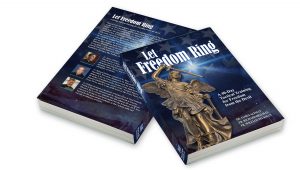 You can enlist in the United States Grace Force HERE (please recruit family and friends!)
You can enlist in the United States Grace Force HERE (please recruit family and friends!)
Information on the United States Grace Force can be found HERE
We highly recommend ordering the book (recently published), authored by Fr. Bill Peckman, Fr. James Altman and Fr. Rick Heilman. This amazing book will be a great tool for easy access, highlighting and bookmarking as you traverse through this 40-day challenge with tens of thousands of other special forces prayer warriors!
You can order the book at RomanCatholicGear.com.
